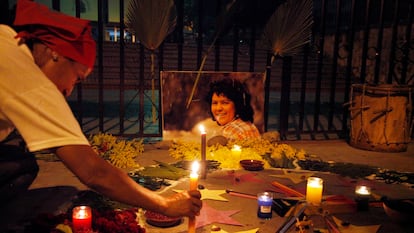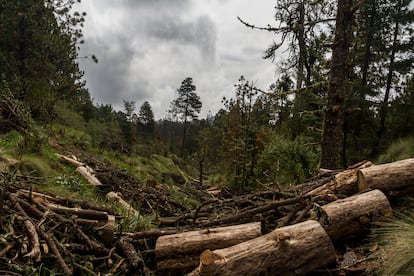International agreement enters into force to end killings of environmental leaders in Latin America
The Escazú accord, achieved after years of negotiations and despite the absence of Brazil and Colombia, compels countries to offer protection to activists


Berta Cáceres, Isidro Baldenegro, Cristina Bautista, Paulo Paulino Guajajara, Yolanda Maturana, Homero Gómez... the long and macabre list of environmental leaders assassinated in the line of their work in the region has led Latin America to formulate a treaty that for the first time offers protection to those trying to protect the natural world. Following years of negotiations and despite the absence of key nations including Colombia, Brazil and Chile, the Escazú Agreement came into effect on April 22.
The agreement has the potential to reverse a spiral of violence against ecologists that has made Latin America the deadliest region in the world for environmental activists. But the accord also runs the risk of becoming a worthless piece of paper if the 12 countries that have ratified it, including Mexico and Argentina, do not take the necessary measures to implement it. In that case, says Mexican environmentalist Leydy Pech, April 22 will become simply a photo opportunity for posterity.
“There are a lot of interests behind the occupation of indigenous lands. We cannot say: the agreement is now in place and now all of our problems are solved. We have to work to ensure it is turned into reality,” says the courageous Mayan beekeeper, who last year received the Goldman Environmental Prize, the Nobel of ecological activism. Pech has plenty of first-hand experience of having laws and treaties on hand only to see them violated with impunity.
Her fight to halt the planting of transgenic soybeans in the Mexican state of Campeche by agrochemical giant Monsanto resulted in an unprecedented victory in the courts in 2015, which led to the cancellation of Monsanto contracts in seven Mexican states. However, the illegal planting of these crops continues on land bordering her communities. “What is missing? Why do they continue planting? What loopholes are they using?” she asks. “The same thing can happen with the Escazú Agreement.”

In one of the most biodiverse regions on the planet, and one replete with socio-environmental problems, the Escazú Agreement faces huge challenges. The text of the accord not only seeks to protect environmental activists but also to dampen potential conflicts by obliging private companies and governments to allow freedom of access to information and public participation in any project that could potentially have an impact on the environment.
Even if the path to its full implementation and adherence will be a difficult one, both Pech and the civil society organizations that drove the treaty have applauded its entry into force. “It is a partial celebration, one that is still under construction, but the important thing is that happened, because it could well have been that there was nothing to celebrate at all,” says Astrid Puentes, co-executive director of the Interamerican Association for Environmental Defense.
The Escazú Agreement began to take shape in 2012 and negotiations went on for six years. Puentes recalls how the clause that demanded protection for environmental activists was on the verge of being omitted from the text due to the reticence of some countries. However, the outrage caused by the 2016 murder of activist and indigenous leader Berta Cáceres in Honduras achieved the necessary pressure for it to be included. The tortuous process for the treaty to come into effect continued for three years after it was signed in 2018, as national congresses deliberated ratifying it. Eventually, the 11 necessary seals of approval were gathered by January 2021.
“There was a region-wide campaign in the industrial and private sectors to cause a stir. There have been many lies told about the Escazú Agreement, such as that it includes new rights that will hinder development,” says Puentes. This was the case with such notable absentees as Chile, Peru and Costa Rica, who were initially among the principal backers of the accord but later declined to approve the text. Of the 24 countries that signed the Escazú Agreement, only 12 national governments went on to ratify it.
Alicia Bárcena, executive secretary of the United Nations’ Economic Commission for Latin America and the Caribbean (CEPAL), says that there is “fear among some companies in the region” over the agreement. “But that should not be the case, because a better economy is constructed through transparency and providing information to the people. A project will perform better if it is carried out with the backing of local communities.”
Among the countries that have refused to sign up to the agreement, Colombia and Brazil - who account for the highest number of assassinations of ecologists in the region - stand out. Bárcena hopes that now the accord has come into effect, it will act as an “appeal” to persuade other countries to ratify it and lend it the necessary weight to bring an end to the dangerous existence led by environmental leaders in the Latin American region.
English version by Rob Train.
Tu suscripción se está usando en otro dispositivo
¿Quieres añadir otro usuario a tu suscripción?
Si continúas leyendo en este dispositivo, no se podrá leer en el otro.
FlechaTu suscripción se está usando en otro dispositivo y solo puedes acceder a EL PAÍS desde un dispositivo a la vez.
Si quieres compartir tu cuenta, cambia tu suscripción a la modalidad Premium, así podrás añadir otro usuario. Cada uno accederá con su propia cuenta de email, lo que os permitirá personalizar vuestra experiencia en EL PAÍS.
¿Tienes una suscripción de empresa? Accede aquí para contratar más cuentas.
En el caso de no saber quién está usando tu cuenta, te recomendamos cambiar tu contraseña aquí.
Si decides continuar compartiendo tu cuenta, este mensaje se mostrará en tu dispositivo y en el de la otra persona que está usando tu cuenta de forma indefinida, afectando a tu experiencia de lectura. Puedes consultar aquí los términos y condiciones de la suscripción digital.








































